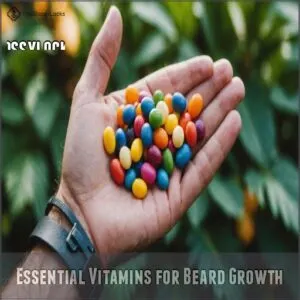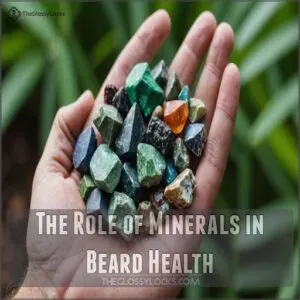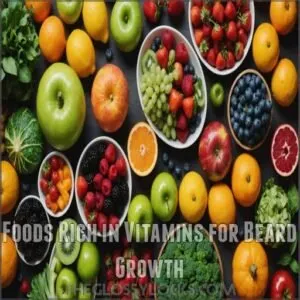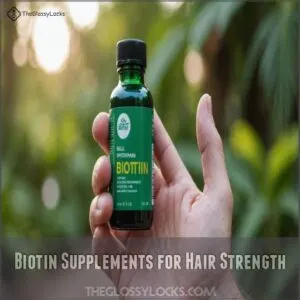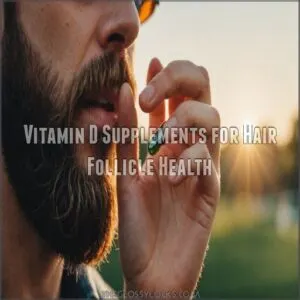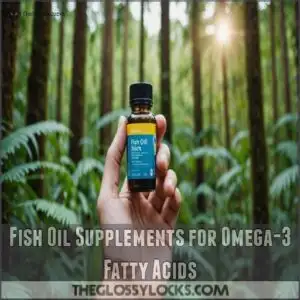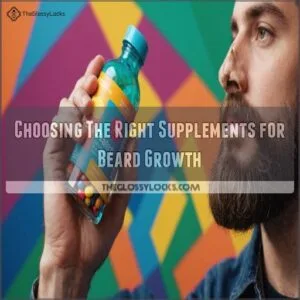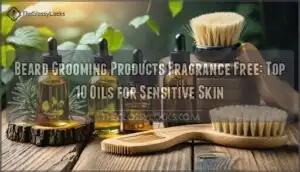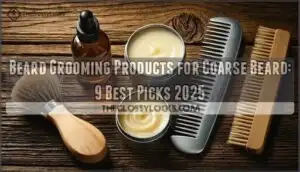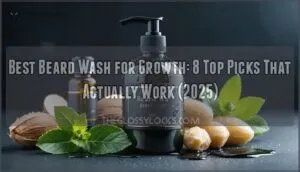This site is supported by our readers. We may earn a commission, at no cost to you, if you purchase through links.
 Your beard’s growth depends on a powerhouse combo of vitamins that work like a dream team. Vitamin A kickstarts cell growth, while B vitamins (especially biotin) boost keratin production – that’s the protein your facial hair’s made of. Vitamin C acts as your beard’s bodyguard against oxidative stress, and vitamin E keeps those follicles healthy and thriving.
Your beard’s growth depends on a powerhouse combo of vitamins that work like a dream team. Vitamin A kickstarts cell growth, while B vitamins (especially biotin) boost keratin production – that’s the protein your facial hair’s made of. Vitamin C acts as your beard’s bodyguard against oxidative stress, and vitamin E keeps those follicles healthy and thriving.
You’ll find these beard-boosting nutrients in everyday foods like eggs, nuts, and leafy greens.
But here’s the thing: vitamins are just one piece of the puzzle. The real magic happens when you combine them with the right minerals and lifestyle habits.
Table Of Contents
- Key Takeaways
- Essential Vitamins for Beard Growth
- The Role of Minerals in Beard Health
- Foods Rich in Vitamins for Beard Growth
- Supplements for Beard Growth Support
- Lifestyle Tips for Optimal Beard Growth
- Frequently Asked Questions (FAQs)
- What vitamins help a beard grow?
- Does castor oil help with the growth of a beard?
- Does vitamin D promote beard growth?
- Why is vitamin C important for beard growth?
- What is the best vitamin for beard growth?
- Does B12 help beard growth?
- Do beard growth vitamins actually work?
- How can I stimulate my beard growth?
- Can biotin supplements cause acne or skin breakouts?
- How long before vitamin supplements show beard results?
- Do beard growth vitamins work differently for age groups?
- Can taking too many vitamins harm beard growth?
- Should vitamin doses change based on beard growth stage?
- Conclusion
Key Takeaways
- You’ll boost beard growth with vitamins A, B (especially biotin), C, and E, which promote cell growth, keratin production, and follicle health.
- You can get these beard-boosting nutrients from foods like eggs, nuts, leafy greens, and fatty fish, or consider supplements like biotin and fish oil.
- Don’t forget about minerals—zinc, iron, and magnesium play crucial roles in beard health and growth.
- Your lifestyle matters too—a balanced diet, regular exercise, stress management, and adequate sleep all contribute to optimal beard growth.
Essential Vitamins for Beard Growth
Want a fuller, healthier beard? You’ll need the right vitamins to support strong hair growth, just like Ayurvedic hair care practices that use essential oils for hair growth, and we’ll show you which ones are key for achieving your beard goals.
Vitamin a for Cell Growth
Think of Vitamin A as the architect in your beard’s growth story.
It plays a starring role in cell growth and skin health, essential for a vibrant hair growth cycle.
Retinoids, a form of Vitamin A, are like personal trainers for your beard, keeping it robust.
So, make sure to include these mighty beard growth vitamins in your diet!
B Vitamins for Keratin Production
From discussing vitamin A for cell growth, let’s chat about B vitamins and their role in keratin production.
These vitamins enhance hair health by strengthening keratin in your follicles, leading to better beard growth.
Key tips:
- Consume a balanced diet with B-rich foods.
- Consider biotin supplements.
- Opt for a vitamin B complex.
- Target hair follicles through nutrition.
Vitamin C for Antioxidant Properties
While B vitamins are all about keratin, vitamin C steps in with its antioxidant properties to support your beard health.
It boosts collagen, which keeps your beard looking sharp.
And if you’re looking for a boost of biotin specifically for beard growth, you can find products like biotin beard supplements.
| Vitamin C Benefit | Description |
|---|---|
| Antioxidant | Protects cells from damage |
| Collagen Formation | Strengthens hair structure |
| Stress Reduction | Alleviates stress impact |
| Source Examples | Oranges, strawberries, and bell peppers |
| Hair Loss Prevention | May lower risk of hair loss |
Vitamin E for Hair Follicle Health
Vitamin E steps up as a key player in hair follicle health, offering antioxidant effects that protect and nourish.
If your beard growth needs a boost, consider Vitamin E supplements or topical application.
A dash of humor for you: it’s like a personal bodyguard for your follicles, keeping them fit and ready to support vibrant beard growth!
The Role of Minerals in Beard Health
Let’s get into the minerals that make your beard shine.
Zinc plays a key role in producing essential proteins.
Iron’s impact is making sure hair follicles get enough oxygen.
Just like how vitamins, such as the ones found in foods like Citrus Fruits for Vitamin C, support beard growth, these minerals help you cultivate that confident beard you’ve always envisioned.
Here’s the lowdown on what you need to know:
- Zinc’s Role: Supports hair tissue growth.
- Iron’s Impact: Some research suggests that ginger, particularly 6-gingerol, may inhibit certain mechanisms that assist in hair growth learn more about ginger and hair growth. Prevents hair loss by aiding oxygen supply.
- Magnesium’s Benefits: Helps energy production for better growth.
- Copper’s Influence: Aids in melanin production for beard color.
Foods Rich in Vitamins for Beard Growth
Eating the right foods can provide your beard with essential vitamins, fueling its growth in a natural way.
Protein-rich eggs and nuts, iron-packed leafy greens, omega-3 filled fatty fish, and whole grains high in B vitamins will give your beard every reason to thrive.
Eggs and Nuts for Protein
So, you’ve nailed the mineral game for beard growth.
Now, let’s talk protein!
Eggs and nuts are fantastic protein sources.
They’re packed with the building blocks your beard needs to thrive.
Think of protein as the fuel for hair growth.
Aim for a good protein intake daily.
Don’t forget, a balanced diet’s key; it’s not just about protein.
Enjoy those delicious eggs and nuts!
They’re a tasty way to boost your beard nutrition and get that magnificent mane you’ve always wanted.
Leafy Greens for Iron
Packed with proteins, eggs and nuts give your beard growth a solid kickstart.
Next on the menu are leafy greens like spinach, loaded with iron.
This mineral boosts blood flow, essential for nourishing facial hair.
If getting enough iron feels like an uphill battle, try adding leafy greens recipes to your diet.
Who knew eating spinach could help avoid anemia—and patchy beards?
Fatty Fish for Omega-3 Fatty Acids
Iron keeps your beard energized, but omega-3 fatty acids in fatty fish like wild-caught salmon take it to the next level.
They boost beard development with their rich fatty-acid profile, similar to how they promote healthy hair growth by nourishing hair follicles.
A well-rounded hair growth diet for men that includes foods rich in biotin and B-vitamins is essential for overall beard health.
Add these to your plate:
- Salmon: Optimizes beard health with omega-3 benefits.
- Tuna: A viable alternative with a similar boost.
- Fish oil supplements: Easy option for staying consistent.
Whole Grains for B Vitamins
Thinking about boosting your beard?
Whole grains might be your unsung hero.
They’re chock-full of B vitamins essential for hair health.
Consider supplementing with beard vitamins like those found at Restovie Beard Vitamins (beard growth supplements) to support your journey.
From enhancing keratin production to improving blood flow to hair follicles, these nutrients help nurture your beard’s growth.
So, grab a bowl of oatmeal or a slice of whole grain bread to keep your facial hair nourished and thriving.
Supplements for Beard Growth Support
If you’re looking to boost your beard game, certain supplements can play an important role in supporting hair growth.
While not a magic potion, options like biotin and fish oil might strengthen hair and improve follicle health, giving you a little extra edge.
Biotin Supplements for Hair Strength
Curious if biotin can boost your beard?
This vitamin is essential for hair strength, playing a role in keratin production.
Here’s a quick rundown:
- Biotin Dosage: A daily intake of 30 mcg is recommended.
- Biotin Side Effects: Generally safe, but consult with a healthcare provider.
- Biotin for Thinning Hair: Supports those facing hair loss challenges, though not a miracle cure.
Vitamin D Supplements for Hair Follicle Health
Imagine this: you’re basking in the sun, soaking up vitamin D, which not only lifts your spirits but also boosts your beard game.
Vitamin D supplements support hair follicle health, essential for facial hair growth.
If you’re facing hair loss or a vitamin D deficiency, chat with your doctor about dosage recommendations and side effects.
A full beard awaits!
Fish Oil Supplements for Omega-3 Fatty Acids
Want a healthy, thick beard? Omega-3 fatty acids, found in fish oil supplements, are your secret weapon!
These essential fats nourish hair follicles, potentially boosting your beard growth rate.
You can also explore beard growth vitamins online at beard growth vitamins.
Look for high-quality fish oil supplements; remember, dosage recommendations vary.
While fish oil benefits are numerous, be aware of potential side effects like upset stomach.
Always check with your doctor before starting any new supplement.
A fuller, healthier beard might be closer than you think!
Choosing The Right Supplements for Beard Growth
When choosing beard growth supplements, prioritize safety and quality.
Look for reputable brands with third-party testing.
Stick to recommended dosages and consider potential interaction risks with medications.
Biotin, vitamin D, and omega-3s are popular choices, but remember, they’re not magic bullets.
A nutrient-dense diet rich in foods that promote natural beard growth is your best bet.
Always consult a healthcare pro before starting any new supplement regimen.
Lifestyle Tips for Optimal Beard Growth
Growing a luscious beard isn’t just about vitamins and supplements. Your lifestyle choices play a key role in beard growth, from what you eat to how much you sleep.
Balanced Diet for Overall Health
Your beard’s growth hinges on what’s on your plate.
A balanced diet fuels your follicles, giving them the nutrients they need to thrive.
Load up on protein-rich foods like eggs and nuts, and don’t skimp on leafy greens for iron.
Whole grains pack a punch with B vitamins, while fatty fish offer omega-3s.
Remember, good nutrition isn’t just for your beard—it’s your ticket to overall health and that majestic mane you’re after.
Regular Exercise for Blood Circulation
With regular exercise, you’re not just sculpting your body – you’re boosting your beard game too.
Cardio gets your blood pumping, delivering essential nutrients to your facial hair follicles.
Mix up your exercise routine with jogging, cycling, or swimming for a circulation boost.
Aim for 30 minutes of moderate activity most days.
This simple beard tip can make a big difference in your growth journey.
Stress Management for Hair Growth
Stress is a common factor in hair loss as mentioned in Ayurvedic hair growth approaches, and stress-induced hair loss can put a damper on your beard growth dreams.
To keep those follicles flourishing, try these stress-busting techniques:
- Practice mindfulness meditation daily to calm your mind and promote hair growth.
- Incorporate yoga into your routine, focusing on poses that increase blood flow to your scalp.
- Take regular breaks throughout the day for deep breathing exercises.
Remember, a relaxed mind leads to a fuller, healthier beard. So take a deep breath and let those whiskers grow!
Adequate Sleep for Hormone Regulation
Sleep plays a major role in beard growth.
It’s not just about catching Z’s; quality shut-eye regulates hormones essential for facial hair.
Aim for 7-9 hours nightly to boost testosterone and reduce stress hormones.
Poor sleep can lead to hormone imbalances, stunting your beard’s potential.
Create a relaxing bedtime routine, limit screen time, and keep your bedroom cool and dark.
Your beard will thank you for prioritizing rest.
Frequently Asked Questions (FAQs)
What vitamins help a beard grow?
Your beard will grow thicker with vitamins B7 (biotin), A, C, D, and E, plus omega-3s.
You’ll find these in eggs, nuts, fish, and leafy greens.
They’re essential for healthy hair follicles.
Does castor oil help with the growth of a beard?
While 85% of men use beard oils, scientific evidence for castor oil’s beard-growing benefits remains limited. You’ll find it can moisturize follicles and prevent breakage, but won’t directly stimulate new growth.
Does vitamin D promote beard growth?
Onion juice, rich in sulfur and antioxidants, can improve blood circulation to the scalp and promote hair growth through hair follicle nourishment. Research confirms that vitamin D stimulates hair follicles and promotes beard growth.
You’ll want to get adequate sunlight or consider supplements, but don’t forget that genetics still play the biggest role in facial hair development.
Why is vitamin C important for beard growth?
Looking for stronger facial hair?
Vitamin C doesn’t just fight off colds – it’s your beard’s bodyguard too.
It protects follicles from damage, boosts collagen production, and helps your body absorb iron for healthy growth.
What is the best vitamin for beard growth?
Biotin (vitamin B7) stands out as your best bet for beard growth, working to produce keratin that strengthens hair follicles.
You’ll find it naturally in eggs, nuts, and meat for that epic facial hair.
Does B12 help beard growth?
Like a spark plug for your facial follicles, vitamin B12 supports your beard’s growth by helping create red blood cells that nourish hair roots.
You’ll need it alongside other B vitamins for best results.
Do beard growth vitamins actually work?
While some beard vitamins might help with deficiencies, they won’t magically boost growth if you’re already healthy.
Your genetics play the biggest role – supplements just support what nature’s already given you.
How can I stimulate my beard growth?
Imagine your beard as a garden.
To cultivate lush growth, nourish it with biotin-rich foods, maintain a balanced diet, and manage stress.
Exercise boosts circulation, while proper skincare keeps the soil fertile.
Patience is key; Rome wasn’t bearded in a day!
Can biotin supplements cause acne or skin breakouts?
Biotin supplements rarely cause acne, but they might in some people.
If you’re prone to breakouts, start with a low dose and monitor your skin.
Remember, a balanced diet usually provides enough biotin without supplements.
How long before vitamin supplements show beard results?
Like a slow-growing oak, beard results from vitamin supplements take time.
You’ll need patience – it can be 3-6 months before you see noticeable changes.
Remember, genetics play a big role too.
Keep at it, bearded warrior!
Do beard growth vitamins work differently for age groups?
Beard growth vitamins can work differently across age groups.
You’ll see more impact in your 20s and 30s when testosterone levels peak.
As you age, the effectiveness may decrease, but a healthy diet remains essential for beard health.
Can taking too many vitamins harm beard growth?
While vitamins are essential for beard health, overdoing it can backfire.
Excessive intake may lead to toxicity, upsetting your body’s balance.
Stick to recommended doses and consult a doctor before supplementing to avoid potential harm to your facial hair growth.
Should vitamin doses change based on beard growth stage?
While nutrients like omega-3 fatty acids and biotin are like superfoods for your beard helping with beard growth, you don’t need to adjust vitamin doses based on beard growth stage.
Consistent intake of a balanced diet provides the nutrients your beard needs throughout its growth cycle.
Consult a doctor if you’re considering supplements for specific concerns.
Conclusion
Growing a lush beard isn’t just about genetics; it’s a science you can master.
By focusing on key vitamins that help beard growth, you’re laying the groundwork for impressive facial hair.
Remember, it’s not just about popping pills—it’s about nourishing your body from the inside out.
Combine vitamin-rich foods with smart supplements, and don’t forget the power of a healthy lifestyle.
With patience and the right approach, you’ll be stroking that magnificent beard in no time.
Your journey to beard greatness starts now.

